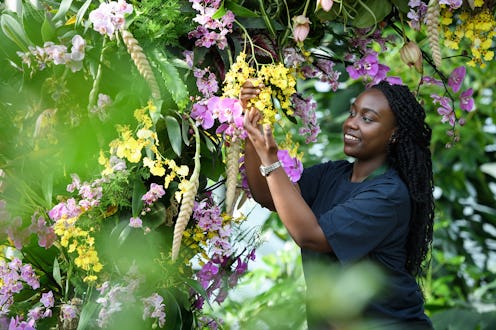Life
Science Says This Is The Best Time To Water Your Plants During The Summer

Warm weather means gorgeous sun, flourishing trees, and lush, blooming gardens, but you might not realize that it’s important to adjust your plant watering schedule during the summer months. It’s no surprise that certain weather conditions, like heat waves and droughts, can pose challenges your gardens and greenery, so what’s the best way to help your plant babies flourish during these long, hot summer days? The Conversation notes that an effective watering schedule is key to keeping plants healthy during the potentially challenging summer season, but knowing the best time of day to water plants during the sweltering summer months takes a little know-how.
Some folks argue that a nighttime watering routine is best, and The Conversation suggests that while this does give ample time for porous soils to absorb water before temperatures skyrocket the next day, leaving leaves wet overnight can up the risk for certain diseases. But morning watering can also mean that your plant’s leaves will dry out faster as the day heats up, while leaving less time for water to penetrate the soil before the heat hits. Wet leaves can also develop burn marks in the sun, according to Gardena — so clearly, the summertime plant watering situation can be just a smidge tricky.
The Conversation says that plants rely on an intricate dance of water intake and water loss in order to thrive. Photosynthesis is the transformative chemical process by which plants convert water and carbon dioxide to oxygen and glucose — so super sunny days are key to that essential process, while water loss helps cool plants down as temperatures climb. Too little water, however, means wilting, thirsty plants.
According to Gardening Know How, the early evening (when the sun isn't shining on blast) is a great time to water your plants. Gardening Know How suggests that watering too late at night can leave delicate plant leaves soaked, and susceptible to disease-causing fungi. The blog also notes that early evening watering gives plants a bit of time to absorb water and dry out a bit before night falls.
The Conversation recommends avoiding watering in full sun for other reasons, as this can cause water to evaporate before your plant gets a chance to soak it up. The Conversation also notes that a good option is to water in the early evening so that plants have time to fully dry out while the roots soak up water overnight.
In terms of how much water is just right, The Conversation suggests that well watered plants don't wilt. And while too-little water isn’t a good thing, neither is too much. Gardena notes that effective watering means that water is reaching your plant’s roots, so water isn’t covering the upper soil area only. And remember that some plants have a greater root depth than others, so your plant baby might look dry on top, but still have good amounts of water going at the root level. A helpful trick is to insert your finger about an inch down into the soil — if it feels wet, it probably doesn't need any more water.
Gardena says that an even distribution of moisture in your plants’ soil is key to good plant health, while allowing a little time to dry out between waterings promotes root growth — and make sure your plants are getting enough water each time. When you water your plants, it’s best to keep leaves dry, and, whatever you do, avoid over watering. According to the Missouri Botanical Garden, too much water can lead to root rot, inhibited growth, and yellowing leaves — so it’s better to water thoroughly and less frequently, than to water too little (or too much) more often. It might seem a little daunting to keep your plants healthy and flourishing during the scorching summer months, but with a little skill and TLC, your plant family can thrive for years to come.